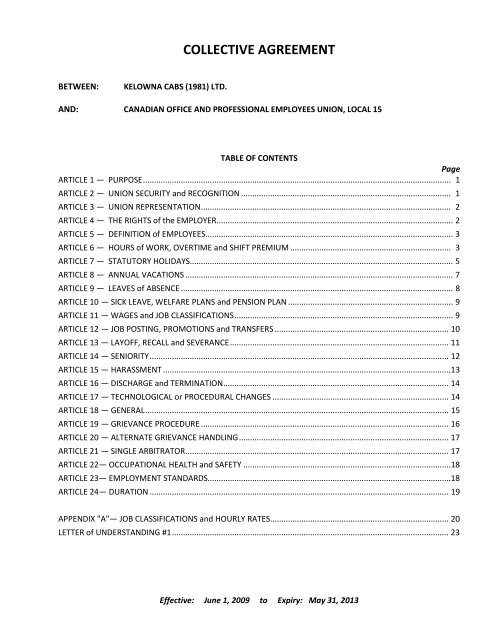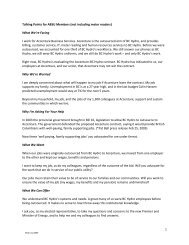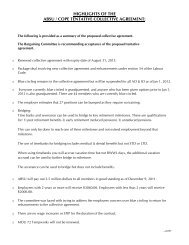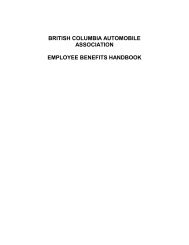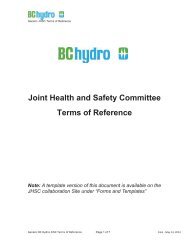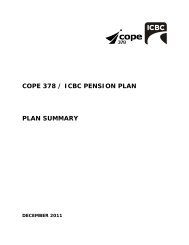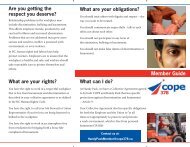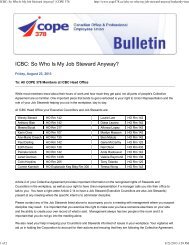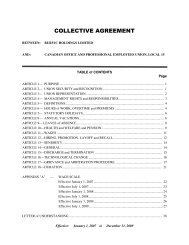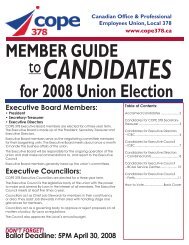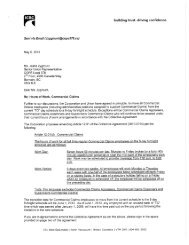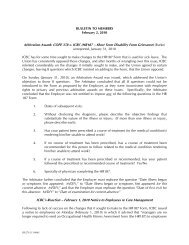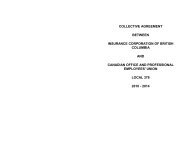COLLECTIVE AGREEMENT - COPE 378
COLLECTIVE AGREEMENT - COPE 378
COLLECTIVE AGREEMENT - COPE 378
Create successful ePaper yourself
Turn your PDF publications into a flip-book with our unique Google optimized e-Paper software.
<strong>COLLECTIVE</strong> <strong>AGREEMENT</strong><br />
BETWEEN:<br />
KELOWNA CABS (1981) LTD.<br />
AND: CANADIAN OFFICE AND PROFESSIONAL EMPLOYEES UNION, LOCAL 15<br />
TABLE OF CONTENTS<br />
Page<br />
ARTICLE 1 — PURPOSE.......................................................................................................................................... 1<br />
ARTICLE 2 — UNION SECURITY and RECOGNITION .............................................................................................. 1<br />
ARTICLE 3 — UNION REPRESENTATION................................................................................................................ 2<br />
ARTICLE 4 — THE RIGHTS of the EMPLOYER.......................................................................................................... 2<br />
ARTICLE 5 — DEFINITION of EMPLOYEES............................................................................................................... 3<br />
ARTICLE 6 — HOURS of WORK, OVERTIME and SHIFT PREMIUM ........................................................................ 3<br />
ARTICLE 7 — STATUTORY HOLIDAYS...................................................................................................................... 5<br />
ARTICLE 8 — ANNUAL VACATIONS ........................................................................................................................ 7<br />
ARTICLE 9 — LEAVES of ABSENCE .......................................................................................................................... 8<br />
ARTICLE 10 — SICK LEAVE, WELFARE PLANS and PENSION PLAN .......................................................................... 9<br />
ARTICLE 11 — WAGES and JOB CLASSIFICATIONS.................................................................................................. 9<br />
ARTICLE 12 — JOB POSTING, PROMOTIONS and TRANSFERS .............................................................................. 10<br />
ARTICLE 13 — LAYOFF, RECALL and SEVERANCE.................................................................................................. 11<br />
ARTICLE 14 — SENIORITY...................................................................................................................................... 12<br />
ARTICLE 15 — HARASSMENT .................................................................................................................................13<br />
ARTICLE 16 — DISCHARGE and TERMINATION..................................................................................................... 14<br />
ARTICLE 17 — TECHNOLOGICAL or PROCEDURAL CHANGES ............................................................................... 14<br />
ARTICLE 18 — GENERAL........................................................................................................................................ 15<br />
ARTICLE 19 — GRIEVANCE PROCEDURE ............................................................................................................... 16<br />
ARTICLE 20 — ALTERNATE GRIEVANCE HANDLING.............................................................................................. 17<br />
ARTICLE 21 — SINGLE ARBITRATOR...................................................................................................................... 17<br />
ARTICLE 22— OCCUPATIONAL HEALTH and SAFETY .............................................................................................18<br />
ARTICLE 23— EMPLOYMENT STANDARDS.............................................................................................................18<br />
ARTICLE 24— DURATION ...................................................................................................................................... 19<br />
APPENDIX "A"— JOB CLASSIFICATIONS and HOURLY RATES................................................................................ 20<br />
LETTER of UNDERSTANDING #1............................................................................................................................ 23<br />
Effective: June 1, 2009 to Expiry: May 31, 2013
BETWEEN:<br />
KELOWNA CABS (1981) LTD.<br />
(hereinafter referred to as the "Company")<br />
AND: CANADIAN OFFICE AND PROFESSIONAL EMPLOYEES UNION, LOCAL 15<br />
(hereinafter referred to as the "Union")<br />
Section 1<br />
Section 2<br />
Section 3<br />
ARTICLE 1 — PURPOSE<br />
The purpose of this Agreement is to maintain a harmonious relationship between the<br />
Company and its employees; to define clearly the hours of work, rates of pay and<br />
conditions of employment; to provide for an amicable method of settling differences<br />
which may from time to time arise; and to promote the mutual interest of the Company<br />
and its employees and in recognition whereof, the Parties hereto covenant and agree as<br />
follows:<br />
Neither the Union nor the Company in carrying out their obligations under this<br />
Agreement shall discriminate in matters of hiring, training, promotion, transfer, layoff,<br />
discharge, wages or otherwise because of race, colour, creed, national origin, age, sex or<br />
marital status.<br />
The Company agrees that "the Employment Standards Act" and Regulations (Act) shall<br />
be recognized as the minimum labour standards for all employees covered by this<br />
Agreement. At no time is it the intent of the Parties to apply any provision(s) of this<br />
collective Agreement to provide lesser standards than those contained within the<br />
aforementioned Act. In the event this collective Agreement does not contain a<br />
provision which is contained in the Act such provision shall be deemed to be<br />
incorporated in the collective Agreement as part of its terms.<br />
Section 1<br />
Section 2<br />
Section 3<br />
Section 4<br />
ARTICLE 2 — UNION SECURITY and RECOGNITION<br />
This Agreement shall apply solely to employees in the bargaining unit for which the<br />
Union is certified under the British Columbia Industrial Relations Act and shall be<br />
binding on the Company and the Union and their respective successors and assigns.<br />
All employees, presently members of the Union, shall as a condition of employment,<br />
remain members of the Union. All employees of the bargaining unit, shall as a condition<br />
of employment, pay the regular monthly Union dues to the Union for the term of the<br />
Agreement. At least the minimum monthly dues shall be paid by casual employees for<br />
all months of employment, and by regular or part-time employees for any month which<br />
said employee was on leave.<br />
The Company further agrees that all new employees hired subsequent to the effective<br />
date of this Agreement shall, as a condition of employment within thirty (30) days from<br />
the date of employment, become and remain members of the Union.<br />
Upon written authorization from the employee, the Company agrees to deduct Union<br />
initiation fees, dues and assessments from the wages of each employee and to transmit<br />
Kelowna Cabs (1981) Ltd.<br />
Collective Agreement — June 1, 2009 to May 31, 2013 Page 1 of 23
the monies so collected to the Secretary-Treasurer of the Union, once monthly, together<br />
with a list of employees from whom such deductions have been made.<br />
Section 1<br />
Section 2<br />
Section 3<br />
Section 4<br />
Section 5<br />
Section 6<br />
Section 7<br />
ARTICLE 3 — UNION REPRESENTATION<br />
The Company shall recognize the Representative(s) selected by the Union for matters<br />
pertaining to collective bargaining, Agreement administration and general Union<br />
business, as the sole and exclusive Representative(s) of all employees within the<br />
bargaining unit as defined in Article 2 of this Agreement.<br />
The Representative(s) of the Union shall have the right to contact the employees at their<br />
place of employment on matters respecting the Agreement or its administration. The<br />
Union will obtain authorization from the Company as to appropriate time for such<br />
contact before meeting the employees.<br />
Office Stewards<br />
The Company shall recognize the Office Steward(s) elected or appointed by the Union<br />
and shall not discharge, discipline or otherwise discriminate against such Office<br />
Steward(s) for carrying out the duties proper to that position. The Union shall inform<br />
the Company of the names of the Office Steward(s).<br />
The Office Steward(s) may, investigate and process grievances or confer with the<br />
Representative(s) of the Union during regular working hours, without loss of pay. The<br />
Steward(s) will obtain permission from their management for such purposes and such<br />
permission will not be unreasonably denied.<br />
The Office Stewards shall have no authority to alter, amend, violate or otherwise change<br />
any part of this Agreement.<br />
All conversations between Office Stewards and grievors pertaining to terms and<br />
conditions of employment or pertaining to any matter in the Collective Agreement shall<br />
be considered privileged. The Parties agree that this privilege would lend itself to a trust<br />
relationship that must exist between Stewards and members.<br />
The Company shall not discharge, discipline or otherwise discriminate against any<br />
member of the Union for participation in or for legitimate action on behalf of the Union,<br />
or for the exercise of rights provided by this Agreement.<br />
Section 1<br />
ARTICLE 4 — THE RIGHTS of the EMPLOYER<br />
The Union recognizes the rights of the Company to operate the business and direct the<br />
working force subject to the provisions of this Agreement and the right of the Union or<br />
employee to grieve, as provided in Articles 19 and 20 and 21.<br />
Kelowna Cabs (1981) Ltd.<br />
Collective Agreement — June 1, 2009 to May 31, 2013 Page 2 of 23
Section 1<br />
Section 2<br />
Section 3<br />
Section 4<br />
Section 5<br />
ARTICLE 5 — DEFINITION of EMPLOYEES<br />
Probationary Period<br />
All newly hired employees, except casual employees, will be considered probationary<br />
for the first one hundred (120) calendar days of employment. After one hundred (120)<br />
days of employment an employee will attain regular status. Casual employees<br />
transferred to or attaining regular status will not be required to serve a probationary<br />
period, provided they have completed at least one hundred (120) calendar days of<br />
employment or sixty-five (65) shifts whichever occurs first.<br />
Regular Employees<br />
A regular employee is any person employed on a full-time permanent basis whose<br />
duties fall within the bargaining unit as defined in Article 2, Section 1, of this Agreement<br />
and who has completed the probationary period as defined in Section 1.<br />
Part-Time Regular<br />
A part-time employee is any person hired to work on a continuing basis but less than the<br />
normal working hours in a month and whose duties fall within the bargaining unit as<br />
defined in Article 2, Section 1 of this Agreement.<br />
Casual Employees<br />
A casual employee is one (1) hired for vacation relief, unusual peak work loads or<br />
emergencies. Such employees shall be paid not less than the hourly rate as established<br />
in Appendix "A" of this Agreement.<br />
The Company or its Representative shall make known to the employees their duties and<br />
from whom they shall receive instructions as to the policies and procedures of the<br />
establishment.<br />
Section 1<br />
ARTICLE 6 — HOURS of WORK, OVERTIME and SHIFT PREMIUM<br />
Each regular and part-time regular employee will have an established shift falling within<br />
the hours set out herein:<br />
(a) The regular work day shall consist of eight (8) consecutive hours, including paid<br />
lunch periods, for five (5) consecutive days and/or a mutually agreed equivalent.<br />
Management retains the right to split a shift for staff shortage reasons but only<br />
upon the approval of the employees being requested to change. Approval of<br />
casual and part-time employees to split shifts is not required.<br />
(b) A regular work week shall consist of a minimum of thirty-two (32) hours and a<br />
maximum of forty (40) hours per week. A regular work day shall consist of eight<br />
(8) hours. Work week shall start with the Sunday day shift.<br />
(c) Each regular and part-time regular office employee shall have an established shift<br />
falling within the hours set out herein:<br />
Monday to Friday inclusive between the hours of 8:00 a.m. and 5:00 p.m.<br />
(d) Each regular and part-time regular Dispatch/Call-taking employee shall have an<br />
established shift falling within the hours set out herein:<br />
Kelowna Cabs (1981) Ltd.<br />
Collective Agreement — June 1, 2009 to May 31, 2013 Page 3 of 23
(e)<br />
Full-Time Dispatchers<br />
Dayshift:<br />
Afternoon:<br />
Graveyard:<br />
Monday to Friday inclusive 8:00 a.m. to 4:00 p.m.<br />
Tuesday to Saturday inclusive 4:00 p.m. to 12:00 p.m.<br />
Wednesday to Sunday inclusive 12:00 a.m. to 8:00 a.m.<br />
There shall be three (3) forty (40) hours full-time<br />
Dispatchers and one (1) thirty-two (32) hour Dispatcher.<br />
Full-Time Calltakers<br />
Dayshift:<br />
Shift Shuttle<br />
— 6.5 hours per day<br />
Monday to Friday inclusive 8:00 a.m. to 5:00 p.m.<br />
In mid December and mid June, the above Dispatch/Call taking shifts shall be<br />
posted for re-bidding in order of seniority. Upon completion of the re-bidding,<br />
not later than mid January and mid July, the new shifts shall be implemented for<br />
the next six (6) months.<br />
Section 2 A paid lunch period of thirty (30) minutes will be provided and taken within the two (2)<br />
Section 3<br />
Section 4<br />
Section 5<br />
Section 6<br />
hours in the middle of the regular working day. Where the Company's work schedule<br />
for Telephone Operators and Dispatchers prohibits a lunch period, the affected<br />
employee(s) who work more than seven (7) consecutive hours without a lunch period<br />
shall be paid an additional three quarters (3/4) of an hour per day at each employee's<br />
current pro-rated hourly rate, in lieu of a thirty (30) minute lunch period. Similarly,<br />
those who work more than five (5) hours up to and including seven (7) hours shall be<br />
paid an additional half (½) hour. Those working five (5) or fewer hours do not get any<br />
additional pay for working through their lunch hour.<br />
Each employee shall be allowed to have coffee at his/her desk during the employee's<br />
shift, without loss of pay, in lieu of relief periods. The Company further agrees to<br />
provide a refreshment service for the employees.<br />
Overtime Premiums<br />
All time worked before or after the regularly established working day shall be<br />
considered overtime and be paid for at one hundred and fifty (150%) per cent of the<br />
employee's pro-rated hourly rate for the first two (2) hours and double the employee's<br />
regular hourly rate for each hour worked thereafter.<br />
All time worked by a full-time regular forty (40) hour employee on his/her regular day<br />
off shall be considered as overtime and shall be paid at the rate of one hundred and fifty<br />
per cent (150%) of the employee’s pro rated hourly rate for the first four (4) hours and<br />
double the employee’s regular rate for each hour worked thereafter. Notwithstanding<br />
the provisions of Section 4 above, all time worked by the thirty-two (32) hour regular<br />
employees, part-time regular employees or casual employees in excess of forty (40)<br />
hours per week shall be considered as overtime and shall be paid in accordance with the<br />
Employment Standards Act.<br />
Any full-time regular employee requested to work overtime beyond the regular work<br />
day shall be allowed a one-half (½ ) hour meal period at the regular pro-rated hourly<br />
rate of pay, provided such overtime is in excess of two (2) hours work. The meal period<br />
Kelowna Cabs (1981) Ltd.<br />
Collective Agreement — June 1, 2009 to May 31, 2013 Page 4 of 23
Section 7<br />
Section 8<br />
Section 9<br />
Section 10<br />
Section 11<br />
may be taken before, during or after the overtime work, as may be mutually agreed.<br />
An employee called back to work after completing a regular day's work, or from a<br />
regular day off shall be paid overtime rates for a minimum of four (4) hours or for time<br />
worked, whichever is greater. Travel time to and from the employee's residence will be<br />
considered as time worked, to a maximum of fifteen (15) minutes each way.<br />
Employees may decline overtime on a seniority basis providing there are other qualified<br />
employees available to perform the work. In such cases, the junior employees cannot<br />
decline to work overtime.<br />
Employees who work overtime may request time off in lieu of overtime pay, but such<br />
time off must be taken at a time mutually agreed upon with the Company. The length<br />
of time off with pay shall be equal to the straight time equivalent to the overtime<br />
earnings.<br />
All employees required to work on an emergency call in basis between the hours of<br />
midnight to 0600 hours and have no other means of transportation that the Company<br />
will provide transportation but payment by the Company will be to a maximum of ten<br />
dollars ($10.00). For any employee who remains at his/her work station in a emergency<br />
situation and has no other means of transportation, the Company will provide<br />
transportation but payment will be to a maximum of ten dollars ($10.00).<br />
Shift Premium<br />
Shift premiums will be paid for all hours worked on the graveyard shift, including parttime<br />
regular shifts, at the rate of fifty cents (50¢) per hour premium for each such shift<br />
worked. Dayshift dispatcher shall receive a shift premium of fifty cents (50¢) per hour<br />
for all hours worked when working alone (no call taker).<br />
ARTICLE 7 — STATUTORY HOLIDAYS<br />
Section 1 (a) The Company agrees to provide all full-time employees with the following<br />
Statutory Holidays, with pay:<br />
New Years Day Good Friday BC Day<br />
Victoria Day Canada Day Labour Day<br />
Thanksgiving Day Remembrance Day Christmas Day<br />
Boxing Day<br />
and any other day that may be stated a legal holiday by the Provincial, Civic<br />
and/or Federal Government. The Company further agrees that should one of the<br />
above Statutory Holidays fall on a regular scheduled day(s) off, the employee shall<br />
receive an additional day or day(s) off, with pay.<br />
In addition to the ten (10) named statutory holidays, the Employer agrees to<br />
provide each employee with a floating holiday between February 1, and March 15,<br />
of each year. This floating holiday is a day off with pay, but is not subject to the<br />
Kelowna Cabs (1981) Ltd.<br />
Collective Agreement — June 1, 2009 to May 31, 2013 Page 5 of 23
(b)<br />
premiums in Section 2 below. Such days shall be taken at a time mutually agreed<br />
to by the Company and the employee.<br />
Non-Christian Faith<br />
Where an employee is of faith other than Christian he/she shall be allowed to<br />
transfer any of the above ten (10) named statutory holidays to some other day of<br />
religious significance in his/her faith.<br />
Section 2 (a) Work performed by a full-time employee on the above Statutory Holidays, will be<br />
Section 3<br />
Section 4<br />
(b)<br />
(c)<br />
(d)<br />
paid for at the rate of one hundred and fifty (150%) per cent of the employee's<br />
regular rate of pay, in addition to another day off with pay for that day. Any<br />
employee who qualifies for Statutory Holiday pay at the rate of one hundred and<br />
fifty (150%) per cent of the employees regular pay and an additional day off may,<br />
at the employee's option and if mutually agreed by management, instead elect to<br />
receive two hundred and fifty (250%) per cent of the employee's regular rate of<br />
pay for such Statutory Holiday. The choice of a specific day off or the monetary<br />
option must be designated within seven (7) days prior to or seven (7) days<br />
following the Statutory Holiday.<br />
All time worked by a full-time employee on a day granted in lieu of the Statutory<br />
Holiday, as provided in Section 1 above, shall be considered overtime and paid at<br />
one hundred and fifty (150%) per cent of the employee's prorated hourly rate.<br />
Should one of the Statutory Holidays designated in the foregoing Section 1 fall on<br />
a part-time regular employee's scheduled day(s) off, that employee shall receive a<br />
pro rated day's pay as prescribed by the Employment Standards Act for the<br />
Statutory Holiday.<br />
Should a part-time or casual employee be required to work on a Statutory Holiday<br />
as per Section 1 above, the rate of pay shall be one hundred and fifty (150%) per<br />
cent of the employee's regular rate of pay, and if the employee qualifies per<br />
Section C, payment will be as per Employment Standards Act.<br />
A day off arising in lieu of a statutory holiday in accordance with Section 1 or Section(a)<br />
shall be taken at a time mutually agreed to between the Company and the employee. If<br />
the employee and the Company are unable to agree on the date, time off in lieu of the<br />
statutory holiday will be taken within one hundred and twenty (120) days immediately<br />
following the statutory holiday, at the cash value accumulated on the banked day<br />
worked.<br />
The banked days in lieu of statutory holidays shall be taken in the order that they were<br />
accumulated.<br />
A day off in lieu arising in accordance with Section 1 (a regularly scheduled day off) shall<br />
be paid when taken. The payment shall be at the amount equal to the regular straight<br />
time equivalent of the last regularly scheduled day worked (in accordance with the<br />
semi-annual shift bid) prior to such applicable statutory holiday. A day off in lieu arising<br />
in accordance with Section 2(a) (a statutory holiday worked) shall be paid when taken.<br />
Payment shall be at the amount equal to the regular straight time equivalent of the<br />
Kelowna Cabs (1981) Ltd.<br />
Collective Agreement — June 1, 2009 to May 31, 2013 Page 6 of 23
egularly scheduled hours worked on the applicable statutory holiday.<br />
Section 5 In the event any of the holidays enumerated in the foregoing Section 1, occur during the<br />
period of an employee's vacation, an additional day's vacation with pay shall be allowed<br />
for each holiday so occurring.<br />
Section 6 Employees, by seniority, may decline to perform work on any regularly scheduled shift<br />
which falls on any Statutory Holiday, but employees with the least seniority in the<br />
bargaining unit cannot decline to work on such Statutory Holiday.<br />
Section 7 Employees required to work New Year's Eve on shifts starting from 6 p.m. to 12<br />
midnight and do not qualify for Statutory Holiday pay shall receive a fifty ($50.00) dollar<br />
bonus.<br />
ARTICLE 8 — ANNUAL VACATIONS<br />
All regular employees shall be entitled to a paid vacation in accordance with the following<br />
schedule:<br />
Section 1 (a) Each employee who completes one (1) year's service shall receive a paid vacation of ten<br />
(10) working days. Payment of such vacation shall be a current salary of four per cent<br />
(4%) of gross earnings for the period in which vacation was earned, whichever is greater.<br />
(b) All employees shall be entitled to fifteen (15) working days paid vacation after four (4)<br />
years service and in each year thereafter. Payment for such vacation shall be at the<br />
employee's current salary or six per cent (6%) of gross earnings for the period in which<br />
vacation was earned, whichever is greater.<br />
(c) All employees shall be entitled to twenty (20) working days paid vacation after seven (7)<br />
years service and in each year thereafter. Payment for such vacation shall be at the<br />
employee's current salary or eight per cent (8%) of gross earnings for the period in which<br />
vacation was earned, whichever is greater.<br />
(d) All employees shall be entitled to twenty-five (25) working days of paid vacation after<br />
thirteen (13) years service and in each year thereafter. Payment for such wages shall be<br />
at the employee's current salary or ten per cent (10%) of gross earnings for the period in<br />
which vacation was earned, whichever is greater.<br />
Section 2 Employee(s) desiring to take vacations in broken periods shall be entitled to take them in<br />
periods of one (1) week, two (2) weeks, three (3) weeks, etc.<br />
Section 3 Employee(s) shall select their vacation periods in order of seniority as defined in this<br />
Agreement; however only one (1) vacation period shall be selected by seniority until all<br />
employees in the signing group have selected one (1) period. Subsequently, all employees in<br />
the signing group who have chosen their vacations in broken periods shall select in order of<br />
seniority for a second vacation period and again for subsequent periods until all periods are<br />
chosen.<br />
Section 4 Employees shall be required to use their vacation within the twelve (12) months following<br />
entitlement.<br />
Kelowna Cabs (1981) Ltd.<br />
Collective Agreement — June 1, 2009 to May 31, 2013 Page 7 of 23
Section 1<br />
Section 2<br />
Section 3<br />
Section 4<br />
Section 5<br />
ARTICLE 9 — LEAVES of ABSENCE<br />
Union Business<br />
Leave of absence without pay will be granted to employees for the purpose of attending to<br />
Union business providing the Company's work requirements will allow for such leave. The<br />
Union will request such leave by giving the Company, in writing, as much notice as possible.<br />
Compassionate Leave<br />
In the case of death in the immediate family, i.e. husband, wife, son, daughter, father, mother,<br />
father-in-law, mother-in-law, sister or brother, a regular employee shall be granted three (3)<br />
working days leave of absence with full pay. Such leave of absence will not be charged against<br />
sick leave, holiday entitlement or other accrued time off. Proof of relationship to the deceased<br />
will be provided by employee if requested.<br />
Leave of Absence<br />
(a) Employees who have completed two (2) or more years of service with the Company may<br />
apply for and receive, where practical, leave of absence up to one (1) week, without<br />
pay, to be taken in an unbroken sequence.<br />
(b) Employees who have completed three (3) or more years of service with the Company<br />
shall, where practical, receive up to two (2) weeks leave of absence without pay,<br />
annually. Such leave shall be taken in an unbroken sequence.<br />
Note: It will be at management’s sole discretion whether leave dates requested are<br />
practical to the company.<br />
Court Duty Pay<br />
An employee summoned to Jury Duty or subpoenaed by the Crown shall be paid wages<br />
amounting to the difference between the amount paid them for jury service and the amount<br />
they would have earned, had they worked on such days. Employees on Jury Duty shall furnish<br />
the Company with such statements of earnings as the Courts may supply. Employees shall<br />
return to work within a reasonable period of time. They shall not be required to report if less<br />
than two (2) hours of their normal shift remains to be worked. Total hours on Jury Duty and<br />
actual work on the job in the office in one (1) day, shall not exceed regular working hours for<br />
purpose establishing the basic work day. Any time worked in excess of the employee’s basic<br />
work day, shall be considered overtime and paid as such. The Company shall not be required<br />
to make up the difference between Jury duty and regular daily pay for Jury Duty, in excess of<br />
one (1) continuous week.<br />
Maternity Leave<br />
Leave of absence in case of pregnancy shall be granted in accordance with the "Employment<br />
Standards Act". Such leave will not affect sick leave entitlement or seniority.<br />
Kelowna Cabs (1981) Ltd.<br />
Collective Agreement — June 1, 2009 to May 31, 2013 Page 8 of 23
Section 1<br />
Section 2<br />
Section 3<br />
Section 4<br />
Section 5<br />
ARTICLE 10 — SICK LEAVE, WELFARE PLANS and PENSION PLAN<br />
Sick Leave<br />
(a) Regular Employees averaging more than three (3) work days per week in a month will be<br />
entitled to one (1) sick day leave with pay with a maximum credit of twelve (12) days<br />
per year. Such sick leave may be accumulated from month to month and year to year<br />
to a maximum of twenty-four (24) actual working days.<br />
(b) Part-Time Employees<br />
Shall accrue sick leave on a pro rated basis. Pro rata accrual shall be calculated by<br />
adding the number of hours worked in a two week period and dividing the total by 80.0<br />
hours (the regular full-time hours). The resulting fraction will be the part of an eight (8)<br />
hour day to be accrued. Part-time sick leave shall be used at the rate of eight (8) hours<br />
for a scheduled eight (8) hour shift.<br />
(c) Casual Employees<br />
Shall neither accrue sick leave nor be paid for the time lost due to sickness.<br />
Medical Plan<br />
The Employer agrees to maintain a Medical Services Plan for the employees. The Employer<br />
shall pay one hundred per cent (100%) of the premium cost.<br />
Group Life Insurance Plan<br />
he Employer agrees to provide a Group Life Insurance Plan as outlined below:<br />
(a) Participation in the Plan by each regular and part-time regular employee covered by this<br />
Agreement is a condition of employment.<br />
(b) Coverage will commence on the first (1st) of the month following completion of sixty<br />
(60) days employment.<br />
(c) Benefits shall be in the sum of twenty-five thousand ($25,000.00) dollars covering death<br />
from any cause and including similar benefits for accidental death and dismemberment.<br />
(d) The Employer shall pay one hundred per cent (100%) of the premium cost.<br />
Dental Plan<br />
The <strong>COPE</strong> Local 15 prepaid Dental Plan, or equivalent, shall be made to all regular and parttime<br />
regular employees desiring same. Premium costs shall be paid by the Employer.<br />
Coverage is: PART A – 80%<br />
PART B – 50%<br />
Extended Health Plan<br />
The Employer agrees to provide an Extended Health Plan for the employees. The Employer<br />
shall pay one hundred per cent (100%) of the premium cost.<br />
ARTICLE 11 — WAGES and JOB CLASSIFICATIONS<br />
Section 1 (a) Employees shall be classified in accordance with the skills used and shall be paid not less<br />
than the minimum rate for such classification in accordance with the Schedule of Job<br />
Classifications and Hourly Rates of Pay as set forth in Appendix "A" attached hereto and<br />
made part of this Agreement.<br />
Kelowna Cabs (1981) Ltd.<br />
Collective Agreement — June 1, 2009 to May 31, 2013 Page 9 of 23
Section 2<br />
Section 3<br />
Section 4<br />
(b) This Agreement provides that the Employer in co-operation with the Union agrees to<br />
have job descriptions for all positions in the bargaining unit completed within one (1)<br />
year of signing of this contract.<br />
It is expressly understood and agreed that the salaries herein provided are minimum scales.<br />
This Agreement shall not be so construed as to reduce the pay or increase the hours of any<br />
employee, within the bargaining unit, nor shall it be so construed that any employee may not<br />
be given an increase in pay before period specified or be advanced or promoted in the service<br />
of the Company.<br />
Any position not covered by Appendix "A", new positions which may be established during the<br />
life of this Agreement, or re-classification of existing positions, shall be subject to negotiations<br />
and agreement between the Company and the Union with respect to classification and salary<br />
for the position in question. In the event the Parties fail to agree, such matters may be<br />
referred to the grievance and arbitration procedures as defined in Articles 19 and 20 and 21 of<br />
this Agreement.<br />
The Company recognizes equal pay for equal work.<br />
Section 1<br />
Section 2<br />
Section 3<br />
Section 4<br />
Section 5<br />
ARTICLE 12 — JOB POSTING, PROMOTIONS and TRANSFERS<br />
It is the intention of the Company to fill job vacancies from within the bargaining unit before<br />
hiring new employees, providing employees are available with the necessary qualifications to<br />
fill the vacant position.<br />
Job Vacancies<br />
Notice of all job vacancies of one calendar week or more shall be posted on the office bulletin<br />
board for forty-eight (48) hours and will include job title, job group and brief description of the<br />
job duties and qualification required. Those employees who make application during this<br />
forty-eight (48) hour period will be considered for the job, except however, employees on<br />
vacation or leave during such period of job postings, shall be eligible to apply for such positions<br />
within the three (3) day period after their return to work. Where a vacancy has not been filled<br />
from within the bargaining unit or from the recall list, the Union may have the right to refer<br />
qualified employees from its unemployed roster.<br />
Emergency Vacancies<br />
Vacancies due to an emergency or a sickness of less than a calendar week shall be filled in<br />
order of seniority by part-time or casual employees provided that they are not already<br />
scheduled to work that day.<br />
If the manager is calling to fill a vacancy for the same day or for the next day he may by pass<br />
any answering machines. If there is more than one day's notice of the vacancy the manager<br />
shall leave a message and ask that the employee respond before 4:00 p.m. or risk being bypassed.<br />
Promotions<br />
Promotion is hereby defined as a move from a lower job group to a higher job group.<br />
Promotion shall be made on the basis of seniority, ability and qualifications. In the event two<br />
Kelowna Cabs (1981) Ltd.<br />
Collective Agreement — June 1, 2009 to May 31, 2013 Page 10 of 23
(2) or more employees have the same relative ability and qualifications, the employee with the<br />
greatest seniority shall be selected.<br />
Section 6 An employee promoted to a higher rated position shall be on trial for the first sixty (60)<br />
calendar days, unless extended by mutual agreement between the Company and the Union. If<br />
during the trial period he/she is considered to be unsuitable, or if he/she decides to return to<br />
their old job, he/she shall be returned to his/her former position or one of equal rank and shall<br />
be paid his/her former salary plus any increments which he/she may have been entitled to had<br />
he/she not been promoted.<br />
Section 7 An employee assigned to a higher job classification or temporarily replacing another employee<br />
in such higher classification, shall be paid at the higher rate for the period so employed. This<br />
provision shall not apply for brief relief periods of less than one-half (½) day.<br />
Section 8 Transfers<br />
An employee transferred from one (1) position to another having the same salary rate range,<br />
shall continue to receive his/her current salary. Time worked on positions having the same<br />
salary ranges shall be cumulative for determining future salary progression.<br />
ARTICLE 13 — LAYOFF, RECALL and SEVERANCE<br />
Section 1 Layoff Procedure<br />
If a reduction of staff is necessary, the following procedure shall be adopted: The employee<br />
with the least amount of seniority in any classification will be the first laid-off from that job,<br />
but they may displace an employee in the same or lower classification, with the least seniority<br />
in such classification, providing they have the qualifications to satisfactorily perform the job<br />
and have greater seniority. Employees who are displaced from their jobs as a result of such<br />
bump-back procedure, may themselves move back and displace employees having less<br />
seniority in the same or lower classification, providing such employees have the necessary<br />
qualifications and seniority.<br />
Section 2 All regular or part-time employees shall be given two (2) weeks notice of layoff or two (2)<br />
weeks salary in lieu of notice.<br />
Section 3 Any regular or part-time employee with six (6) months or more of service who is laid-off due to<br />
lack of work or redundancy, shall be placed on the recall list for a period of one (1) year.<br />
Section 4 Recall<br />
Notice of recall to an employee who has been laid-off shall be made by registered mail to the<br />
last known address of the employee. The employee must respond to such notice within three<br />
(3) days of receiving it or possibly lose rights of seniority and recall; however, an employee<br />
who is prevented from responding to a recall notice because of illness or other reason beyond<br />
the employee's control shall not lose such rights thereby, but such employee may be bypassed<br />
for the position available. An employee bypassed as provided above, will remain on the recall<br />
list for the remaining recall period.<br />
Section 5 Employees on the recall list shall have the right to return to a vacancy in their former job<br />
classification or to a similar classification for which they are qualified providing no other<br />
Kelowna Cabs (1981) Ltd.<br />
Collective Agreement — June 1, 2009 to May 31, 2013 Page 11 of 23
Section 6<br />
Section 7<br />
employee with greater seniority is not promoted or transferred to such vacant position. When<br />
such transfers or promotions occur, resulting in a vacant position, the employee on the recall<br />
list will be offered the resulting vacant position.<br />
Salary Policy on Recall<br />
(a) Employees recalled to their former position or to a position having the same salary range<br />
shall receive the current salary for the position.<br />
(b) Employees recalled to a position which has a lower salary range than their former<br />
position, shall be paid their former salary if it is not higher than the maximum rate for<br />
the position to which they are recalled. In cases where the former salary is higher, they<br />
shall be paid the maximum rate for the lower position.<br />
(c) The foregoing salary policy shall also apply in the case of demotions due to lay-offs and<br />
other circumstances.<br />
Severance Pay<br />
Severance pay shall be paid to employees who have service of one (1) year and more with the<br />
Company, who are terminated due to consolidation, reduction of office staff, suspension of<br />
business or changes in procedures. The amount of severance pay shall be one (1) week at the<br />
employee's current regular salary for each year of service, to a maximum of ten (10) weeks.<br />
Such severance pay shall be pro rated for part-time employees, i.e. an employee who works<br />
three (3) days per week and who otherwise qualifies, will receive ten (10) weeks severance pay<br />
of three (3) days each.<br />
Section 1<br />
Section 2<br />
Section 3<br />
Section 4<br />
Section 5<br />
ARTICLE 14 — SENIORITY<br />
Upon completion of the probationary period, employees shall be entitled to all rights and<br />
privileges of this Agreement and the employee's seniority shall be effective from the original<br />
date of employment.<br />
Seniority shall mean length of continuous service with the Company and its predecessors, as a<br />
Union member, except that credit shall be given for all continuous service prior to certification<br />
of the bargaining unit.<br />
Full-Time List<br />
Regular full-time employees shall have their seniority records kept on the full-time list in order<br />
of original date of employment.<br />
Part-Time / Casual List<br />
Regular part-time and casual employees shall accrue seniority on the basis of the hours<br />
worked in accumulation. Such seniority records shall be kept on a separate part-time/casual<br />
seniority list which shall be subordinate to the regular (full-time) list.<br />
Part-Time Employees<br />
Any part-time employee with the seniority and the ability can take a regular job if it should<br />
become vacant. Part-time seniority will only be used for purposes of promotions, lateral<br />
transfers, demotions due to reduction of staff, exercising "bumping privileges" or bidding on<br />
the semi-annual posting.<br />
Kelowna Cabs (1981) Ltd.<br />
Collective Agreement — June 1, 2009 to May 31, 2013 Page 12 of 23
Section 6<br />
Section 7<br />
Section 8<br />
Section 9<br />
Section 10<br />
Casual Employees<br />
Casual seniority shall only be used for bidding on the semi-annual posting. Casual employees<br />
who attain regular or part-time status shall be subject to the probationary period and shall<br />
have seniority credited from the date of entry as a regular (full or part-time) employee of the<br />
Company.<br />
Except as otherwise provided in this Agreement, an employee who leaves the bargaining unit<br />
and subsequently returns, will be considered a new employee from the date of re-entering the<br />
bargaining unit for purposes of seniority credit.<br />
An employee laid-off and placed on the recall list under Article 13, Section 1, will retain but will<br />
not accumulate seniority during the period of lay-off.<br />
An employee on leave of absence under Article 9 or Article 10, will continue to accrue seniority<br />
during such leave of absence.<br />
Within the office, the Company shall post and maintain separate seniority listings for the<br />
regular full-time and the part-time/casual employees. Such up-to-date listings will be posted<br />
as of January 1st and July 1st of each year, with copies of each current list provided to the<br />
Union by the Company. Any employee wishing to protest his/her seniority must do so by<br />
formally reducing his/her protest to writing and submitting same to the Company and the<br />
Union within thirty (30) days of the posting of the said listings.<br />
Section 1<br />
Section 2<br />
ARTICLE 15 — HARASSMENT<br />
Policy<br />
Every employee is entitled to work in an environment free of sexual/psychological and/or<br />
verbal harassment. The Employer will make every reasonable effort to ensure that this is the<br />
case, and each employee also has the responsibility to foster and support an harassment free<br />
environment. Appropriate disciplinary action will be taken by the Employer against any<br />
employee, (staff, management, elected official, owner or driver) whose conduct constitutes a<br />
breach of this policy. Under no circumstances will the Employer tolerate instances of<br />
retaliation against any employee bringing forward a complaint or participating in the<br />
investigation process.<br />
Definition<br />
(a) Sexual harassment is conduct of a sexual nature that either is likely to cause offence or<br />
humiliation to an employee, or that might reasonably be perceived by that employee as<br />
placing a condition of a sexual nature on employment or on any opportunity for<br />
advancement, or which otherwise results in adverse job-related consequences for the<br />
employee.<br />
(b) Psychological and/or verbal abuse is defined as offensive comments or actions<br />
maliciously and repeatedly made and/or actions specifically designed to demean,<br />
disparage, or belittle an individual and/or to cause personal degradation and/or fear for<br />
personal safety.<br />
Kelowna Cabs (1981) Ltd.<br />
Collective Agreement — June 1, 2009 to May 31, 2013 Page 13 of 23
Section 3<br />
Process<br />
(a) Employees may communicate incidents of harassment to their immediate Supervisor,<br />
the General Manager, the President of Kelowna Cabs or the designated contact person.<br />
(b) Complaints will be kept in confidence by all parties except as may be necessary to<br />
inquire into and respond to the concerns.<br />
(c) The Employer will inquire into complaints and notify the complainant and any other<br />
party directly concerned with its conclusions.<br />
(d) In cases where a complaint of sexual harassment is confirmed, each case will be handled<br />
on its own merits and the Employer will undertake appropriate disciplinary action.<br />
(e) Persons who are determined to have misused the policy will be subject to appropriate<br />
disciplinary action by the Employer.<br />
(f) Nothing in this policy compels anyone to make a complaint nor does it replace any other<br />
legal rights an employee may have.<br />
Section 1<br />
Section 2<br />
Section 3<br />
ARTICLE 16 — DISCHARGE and TERMINATION<br />
It is hereby agreed that the Company has the right to discharge an employee for reasonable<br />
and sufficient cause. The Company agrees to advise the Union of any such discharge and the<br />
reasons therefore at time of such action. It recognized, by the parties, that consistent refusal<br />
of casual work may result in termination.<br />
If an employee is to be terminated, except as provided in Section 1 above, said employee shall<br />
receive two (2) weeks notice prior to the date of termination, or two (2) weeks wages in lieu of<br />
notice. If notice is given prior to the vacation period of any employee, such employee shall<br />
receive two (2) weeks wages, at the employee's current salary, in addition to vacation pay to<br />
which the employee is entitled, plus all other benefits. The employee where possible, shall<br />
give the Company two (2) weeks notice of intention to terminate service.<br />
If upon joint investigation by the Union and the Company, or by decision of an Arbitration<br />
Board so appointed pursuant to the terms of this Agreement, it shall be found that an<br />
employee has been unjustly discharged, such employee shall be reinstated to his/her former<br />
position without any loss of seniority or rank, and shall suffer no reduction in salary.<br />
Compensation for salary lost by such employee shall be as mutually agreed between the<br />
Company and the Union or as determined by arbitration.<br />
Section 1<br />
Section 2<br />
ARTICLE 17 — TECHNOLOGICAL or PROCEDURAL CHANGES<br />
The Company will provide the Union with at least three (3) months notice of intention to<br />
introduce automation, equipment or procedures and/or mergers with other Companies which<br />
might result in displacement or reduction of personnel or in changes of job classification.<br />
In cases where employees are not trainable for available positions or where other positions<br />
with the Company are not available, the employees may elect for termination of employment<br />
or may elect to be placed on the recall list. An employee on recall under this Section, shall<br />
Kelowna Cabs (1981) Ltd.<br />
Collective Agreement — June 1, 2009 to May 31, 2013 Page 14 of 23
Section 3<br />
Section 4<br />
Section 5<br />
Section 6<br />
Section 7<br />
Section 1<br />
Section 2<br />
Section 3<br />
Section 4<br />
Section 5<br />
receive all the benefits which he/she had accrued during employment at the end of the recall<br />
period, or at such earlier time as he/she may elect to terminate.<br />
A specified extension of the recall period, where recall is applied under Section 2 above, may<br />
be mutually agreed by the employee and the Company, subject to written approval by the<br />
Union.<br />
Severance pay as provided for in Article 13, Section 7, shall be due and payable to a displaced<br />
employee, immediately upon separation in addition to the required notice or pay, in lieu of<br />
such notice, as defined in Article 16, Section 2, and all vacation allowances to which the<br />
employee may be entitled.<br />
Job Security<br />
The Company agrees that there shall be no job loss during the term of this collective<br />
Agreement, nor shall any Union member be terminated without just cause, while the current<br />
dispatch system is in place. In the event, the Company participates in a centralized or<br />
computerized dispatch system, or amalgamates entirely with another Taxi Company, the<br />
intention of the Company would be to retain all or as many of the Union members as possible.<br />
Failing agreement on a merged seniority list, an application shall be made to the Labour<br />
Relations Board, for a ruling.<br />
Where newly created or revised jobs are to be implemented, the Company in order of<br />
seniority, further agrees to arrange an on-the-job training program during regular working<br />
hours for those who may be affected, at no cost to the employees involved.<br />
The Company agrees to supply full and complete information to the Union as may be required<br />
to ensure the proper operation of this Article.<br />
ARTICLE 18 — GENERAL<br />
The regular pay day shall be on alternate Wednesdays and the pay cheques shall be available<br />
no later than 12:00 o'clock, noon, properly signed and ready for distribution.<br />
Employees shall not be asked to make any written or verbal contract which may conflict with<br />
this Agreement.<br />
Working conditions and benefits at present in force which are not specifically mentioned in<br />
this Agreement and are not contrary to its intention, shall continue in full force and effect.<br />
Sub-Contracting<br />
No office work normally performed by employees within the bargaining unit as covered in this<br />
Agreement shall be sub-contracted by the Company to or through employment agencies or<br />
other such sundry type overload agencies, other Company locations, or to an individual, except<br />
where qualified Union members are not available to perform the required work upon mutual<br />
agreement.<br />
Picket Lines<br />
It shall not be a violation of this Agreement or cause for discharge of any employee, in the<br />
performance of his/her duties, to refuse to cross a legal picket line recognized by the Union.<br />
The Union shall notify the Company as soon as possible of the existence of such recognized<br />
picket lines.<br />
Kelowna Cabs (1981) Ltd.<br />
Collective Agreement — June 1, 2009 to May 31, 2013 Page 15 of 23
Section 6<br />
Section 7<br />
Section 8<br />
Section 9<br />
Section 10<br />
Section 11<br />
Bulletin Boards<br />
A bulletin board will be made available to the Union in the office for the purpose of posting<br />
Union notices relating to meetings and general Union activities. A copy of each notice shall be<br />
submitted to the Company before being posted. This bulletin board shall be used for notices<br />
by the Company or the Union.<br />
Health and Safety<br />
The Company agrees to provide a safe, properly lighted, heated and ventilated place of work<br />
with restrooms and first aid facilities as required by applicable federal and provincial statute.<br />
The Company further agrees to provide a healthful work environment for all employees (and<br />
proper protection for pregnant female employees where V.D.T.'s or similar technology is on<br />
the Company's premises).<br />
Facilities<br />
The Company agrees to provide a small refrigerator and microwave oven for the benefit of the<br />
employees.<br />
Disciplinary Letters<br />
All Disciplinary Letters in an employee's file will be expunged after twenty-four (24) months<br />
without further incident. Any employee will be given the opportunity on seven (7) days' notice<br />
to the Employer to review their personnel file.<br />
The Employer will arrange to install an intercom – electric lock system to allow access by the<br />
front door to employees reporting to work during the period that the front door is normally<br />
locked.<br />
VDT's<br />
It shall be the Employer's responsibility to ensure that the VDT equipment meets all the WCB<br />
and Federal Government safety standards.<br />
Section 1<br />
Section 2<br />
ARTICLE 19 — GRIEVANCE PROCEDURE<br />
"Grievance" means any difference or dispute concerning the interpretation, application,<br />
administration or alleged violation of this collective Agreement whether between the<br />
Company and any employee or employees bound by this collective Agreement, or between<br />
the Company and the Union.<br />
Grievances or complaints shall be settled in the following manner:<br />
(a) If the employee has a complaint against the Company, it shall be referred to as a<br />
grievance and the procedure for settlement shall commence with Step l.<br />
(b) If the Company or the Union has a complaint, it shall be referred to as a dispute, and the<br />
procedure for settlement shall commence with Step 3.<br />
STEP 1:<br />
The employee involved shall first take up the grievance with the General Manager directly in<br />
charge of the work within ten (10) working days of the circumstances giving rise to the<br />
grievance. The employee must be accompanied by an Office Steward or Representative of the<br />
Union.<br />
Kelowna Cabs (1981) Ltd.<br />
Collective Agreement — June 1, 2009 to May 31, 2013 Page 16 of 23
Section 3<br />
Section 1<br />
Section 2<br />
Section 1<br />
Section 2<br />
STEP 2:<br />
If the grievance is not satisfactorily settled at Step 1, the employee and Office Steward or<br />
Representative shall submit the grievance, in writing, to the General Manager, within the next<br />
ten (10) working days.<br />
STEP 3(a):<br />
If a satisfactory settlement is not reached at Step 2, the grievance shall be referred within the<br />
next ten (10) working days, to the Representative(s) of the Union and the Representative(s) of<br />
the Company. Failing settlement within a further ten (10) working days of receipt of notice,<br />
the dispute shall be referred to arbitration, as set forth in Article 19.<br />
STEP 3(b):<br />
In the event a grievance is initiated by the Company or the Union, the Party initiating the<br />
grievance shall notify the other Party, in writing, of the nature of the dispute, and such notice<br />
shall be given within ten (10) working days of the circumstances giving rise to the grievance<br />
unless the Parties agree to an extension of time. Failing settlement within ten (10) working<br />
days of receipt of notice, the dispute may be referred to arbitration, as set forth in Article 20<br />
or 21.<br />
The time limits set forth in this Article may be extended by mutual agreement between the<br />
Union and the Company.<br />
ARTICLE 20 — ALTERNATE GRIEVANCE HANDLING<br />
Where a difference arises between the Parties relating to the dismissal, discipline or<br />
suspension of an employee, or to the interpretation, application, operation or alleged violation<br />
of this Agreement, including any question as to whether a matter is arbitrable, during the term<br />
of the collective Agreement Jack Gerow, or a substitute agreed to by the Parties, shall at the<br />
request of either Party<br />
(a) investigate the difference;<br />
(b) define the issue in the difference; and<br />
(c) make written recommendations to resolve the difference within five (5) days of the date<br />
of receipt of the request; and, for those five (5) days from that date, time does not run in<br />
respect of the Grievance Procedure.<br />
In the event it becomes available from the Mediation Services Branch the Union and the<br />
Company agree to avail themselves of preventative mediation.<br />
ARTICLE 21 — SINGLE ARBITRATOR<br />
As an alternative procedure to Article 20, the Parties to this Agreement may, if it is mutually<br />
agreed to do so, agree upon a Single Arbitrator as a means of settling disputes appropriate to<br />
such procedure, as follows:<br />
The Party desiring arbitration under this Article will notify the other Party, in writing, in<br />
accordance with the provisions of Section 2, Step 3 of Article 19. The notice may set out the<br />
question(s), in the opinion of the Party seeking arbitration, to be arbitrated.<br />
Kelowna Cabs (1981) Ltd.<br />
Collective Agreement — June 1, 2009 to May 31, 2013 Page 17 of 23
Section 3<br />
Section 4<br />
Section 5<br />
The Parties to the dispute will thereupon meet within ten (10) working days to decide upon an<br />
Arbitrator. Failing agreement upon a person willing to act, or in the event one of the Parties<br />
declines the procedure, either Party may apply to the Minister of Labour for the Province of<br />
British Columbia to appoint an Arbitrator. Hearings shall commence within thirty (30) working<br />
days of the appointment of the Arbitrator.<br />
Upon agreed appointment of an Arbitrator, the Arbitrator shall hear the Parties, settle the<br />
terms of question to be arbitrated and make his award within fifteen (15) working days of the<br />
appointment or within such extended period as may be mutually agreed to by the Parties to<br />
the dispute. The Arbitrator shall deliver his award, in writing, to each of the Parties and the<br />
award shall be final and binding on the Parties, and shall be carried out forthwith. The<br />
Arbitrator shall not be vested with the power to change, modify or alter any of the terms of<br />
this Agreement.<br />
Each Party shall pay their own costs and expenses of the Arbitration and one-half (½) the<br />
remuneration and disbursements or expenses of the Arbitrator<br />
(a)<br />
(b)<br />
ARTICLE 22 — OCCUPATIONAL HEALTH and SAFETY<br />
The Employer agrees to comply with the provisions of the Occupational Health and<br />
Safety Regulation, BC Regulation 296/97 and make a specific review of their office<br />
facilities for compliance with the ergonomics (MSI) requirements, Sections 4.46 through<br />
4.53 included.<br />
Safety Committee<br />
There shall be established a health, safety, and fire committee, made up of two (2)<br />
persons from management and two (2) persons from the bargaining unit. This<br />
committee shall meet as required by the Occupational Health & Safety Act.<br />
ARTICLE 23 — EMPLOYMENT STANDARDS<br />
The Employer agrees that any provision of the Employment Standards Act 1995 not specifically<br />
covered by this Collective Agreement or which is superior to a provision of this Collective<br />
Agreement as it applies to a particular group of employees shall be deemed to be a part of this<br />
Collective Agreement for that particular group of employees.<br />
Kelowna Cabs (1981) Ltd.<br />
Collective Agreement — June 1, 2009 to May 31, 2013 Page 18 of 23
ARTICLE 24 — DURATION<br />
Section 1 (a) This Agreement shall be in full force and effect on and after the 1st day of June<br />
2009, to and including the 31st day of May 2013, and shall automatically be<br />
renewed and remain in full force and effect from year to year thereafter, unless<br />
either Party serves written notice upon the other Party hereto, of intention to open<br />
the Agreement for negotiation and revision or renewal, at least sixty (60) days prior<br />
to the 31st of May 2013, or sixty (60) days prior to the 31st day of May in any year<br />
prior or subsequent thereto. If written notice is given by a Party hereto, the other<br />
Party to the Agreement shall be required to commence collective bargaining with a<br />
view to the conclusion of a renewal or revision of the collective Agreement, or a new<br />
collective Agreement.<br />
Where such notice is given, the provisions of this Agreement shall<br />
continue in full force and effect until a new Agreement is signed and<br />
executed or the Union commences strike action or the Employer<br />
commences a lock-out whichever first occurs.<br />
Section 2 It is mutually agreed by the Parties to exclude from this Agreement the operation of<br />
Section 50(2) and 50(3) of the Labour Relations Code.<br />
Section 3 Severability<br />
In the event that any provision of this Agreement shall at any time be declared invalid by<br />
any court or competent jurisdiction or through government regulations or decree, such<br />
decision shall not invalidate the entire Agreement. It is the express intention of the Parties<br />
hereto that all other provisions not declared invalid shall remain in force and effect.<br />
Signed at , BC this day of , 2009<br />
SIGNED ON BEHALF OF THE EMPLOYER<br />
Party of the First Part;<br />
SIGNED ON BEHALF OF THE UNION<br />
Party of the Second Part;<br />
Jack Gerow— Business Representative<br />
Charmaine Murray — Secretary-Treasurer<br />
E&OE<br />
JG/ae:cope15/c ep467<br />
W:\K.C\Agrmnt\Coll.Agrmnt\June 1.2009_May 31.2013_Final.doc<br />
Kelowna Cabs (1981) Ltd.<br />
Collective Agreement — June 1, 2009 to May 31, 2013 Page 19 of 23
APPENDIX "A"<br />
JOB CLASSIFICATIONS and HOURLY RATES<br />
Classifications<br />
Dispatcher 1<br />
Office Clerk<br />
Dispatcher 2<br />
Call Taker /<br />
Dispatcher<br />
Call Taker 1<br />
Bookkeeper<br />
A worker who, in addition to the duties of a CT, has:<br />
< detailed knowledge of the city<br />
< experience in the taxi industry<br />
< basic understanding of radio practices<br />
and whose duties, with or without supervision, may include but is not limited to:<br />
< supervision of all call takers<br />
< answering calls as needed<br />
< using the radio, computer, monitors, and other related equipment as required to dispatch<br />
and fill the request of the taxi operators<br />
< maintain order and discipline of the fleet in accordance with company's guidelines, policies<br />
and memos<br />
< initiating predates of corporate accounts such as Air Canada, etc. as required<br />
< providing trip estimates and other related data pertaining to the smooth operation of our<br />
fleet including emergency situations<br />
A worker who:<br />
< assists the bookkeeper<br />
< performs data entry<br />
< customer service<br />
< any assigned duties by bookkeeper<br />
After one (1) year regular shifting as dispatcher.<br />
Employed as a full-time Call Taker who will be responsible for dispatching during lunch<br />
Dispatcher meal breaks.<br />
A worker who has:<br />
< no previous experience<br />
< reasonable knowledge of the city (demonstrated through test)<br />
< a command of English<br />
and whose duties, under supervision, may include, but are not limited to:<br />
< answering telephone requests for taxi service or other related data<br />
< entering all relevant data into computer promptly<br />
< responding to calls of a general nature including trip costs, messages, etc.<br />
< contacting the Dispatcher when unable to resolve any difficulties<br />
Daily/Weekly:<br />
< handles all incoming inquiries<br />
< processes Handi-Dart<br />
< shareholder charge summaries-calculate, batch, post<br />
< filing<br />
< sets up new accounts<br />
< clerical/secretarial duties-drafting letters, memos, reports, handles customers that walk in<br />
to pay bills, customer inquiries, occasional call taking, and any other general office duties<br />
assigned by management<br />
Kelowna Cabs (1981) Ltd.<br />
Collective Agreement — June 1, 2009 to May 31, 2013 Page 20 of 23
Monthly<br />
< prints out statements of all accounts<br />
< Taxi-Savers–hand delivers statement with chits to City Hall<br />
< Handi-Dart–hand delivers statement, chits, tickets to Handy Dart<br />
< Business Accounts–attaches chits to statements and mails to customers<br />
< Personal Accounts–mails out statements to customers<br />
< Reconciles all accounts for the month<br />
All Accounting to Trial Balance:<br />
< monthly, quarterly and yearly reports<br />
< GST–posting, remittances and payables<br />
< Payables–posting, reconciling, writing and distributing payments<br />
< Receivables–posting, reconciling, collecting and invoicing<br />
< Fuel Accounts–posting, invoicing, collecting and reconciling<br />
< Payroll–posting driver and office, CRA remittances, WCB remittances, T4's and distribution<br />
of T4's<br />
< Year End–reconciling accounts, preparing documentation for accountant and posting<br />
adjusting entries from accountant<br />
< Bank Deposits–posting and reconciling<br />
Kelowna Cabs (1981) Ltd.<br />
Collective Agreement — June 1, 2009 to May 31, 2013 Page 21 of 23
WAGES<br />
Hourly Rate<br />
AFTER AFTER<br />
START 1 YEAR 2 YEARS<br />
Probationary Call Taker June 1, 2009 12.50<br />
June 1, 2010 12.75<br />
June 1, 2011 13.00<br />
June 1, 2012 13.32<br />
Call Taker June 1, 2009 12.50 14.79 15.05<br />
Office Clerk June 1, 2010 12.75 15.09 15.35<br />
June 1, 2011 13.00 15.43 15.70<br />
June 1, 2012 13.32 15.81 16.09<br />
Dispatcher June 1, 2009 12.50 14.79 15.05<br />
June 1, 2010 12.75 15.09 15.35<br />
June 1, 2011 13.00 15.43 15.70<br />
June 1, 2012 13.32 15.81 16.09<br />
Bookkeeper June 1, 2009 16.32 17.34 18.36<br />
June 1, 2010 16.65 17.69 18.73<br />
June 1, 2011 17.02 18.08 19.15<br />
June 1, 2012 17.45 18.54 19.63<br />
E&OE<br />
JG/ae::cope15/cep467<br />
W:\K.C\Agrmnt\Coll.Agrmnt\June 1.2009_May 31.2013_Final.doc<br />
Kelowna Cabs (1981) Ltd.<br />
Collective Agreement — June 1, 2009 to May 31, 2013 Page 22 of 23
LETTER of UNDERSTANDING #1<br />
BETWEEN:<br />
KELOWNA CABS (1981) LTD.<br />
AND: Canadian Office and Professional Employees Union, Local 15<br />
It is agreed and understood that due to the new dispatch system and concern about staff being available for<br />
emergencies and vacations that the Employer commits to the following:<br />
(a)<br />
(b)<br />
(c)<br />
(d)<br />
every effort will be made to train and have available coverage in the bargaining unit;<br />
when bargaining unit members are not available a driver or shareholder may be used to cover the shift<br />
or portion thereof;<br />
the driver or shareholder shall not be hired to replace bargaining unit employees and shall not be part of<br />
the bargaining unit or covered by the Certificate issued by the Labour Relations Board or the current<br />
Collective Agreement;<br />
the Employer will pay to the union a work permit fee of $5.00 for each shift or portion worked submitted<br />
along with the union dues showing shifts paid for.<br />
Signed at , BC this day of , 2009<br />
SIGNED ON BEHALF OF THE EMPLOYER<br />
Party of the First Part;<br />
SIGNED ON BEHALF OF THE UNION<br />
Party of the Second Part;<br />
Jack Gerow — Business Representative<br />
Charmaine Murray — Secretary-Treasurer<br />
E&OE<br />
JG/ae:cope15/cep467<br />
W:\K.C\Agrmnt\Coll.Agrmnt\June 1.2009_May 31.2013_Final.doc<br />
Kelowna Cabs (1981) Ltd.<br />
Collective Agreement — June 1, 2009 to May 31, 2013 Page 23 of 23


